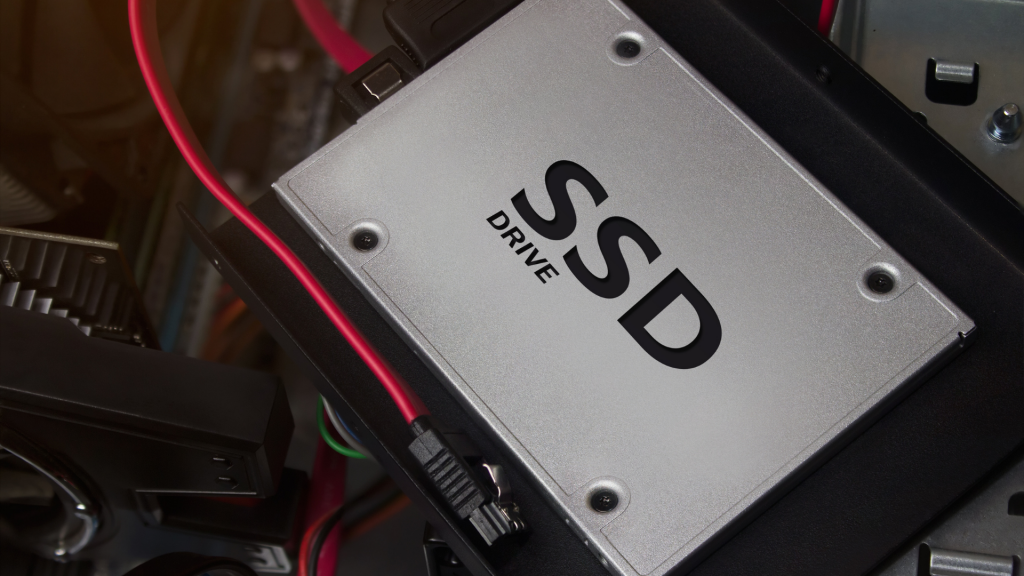In today’s world of data, being able to find and access files quickly is a must. This means that any device or storage you use needs to be fast: think milliseconds not seconds.
An SSD speeds up every task you do — from opening programs like Microsoft Word or Photoshop right down tiled messages such as Outlook Mailbox – by around six times without having those pesky mechanical hard drive components that have a higher chance for files going missing due to shock and accidental deletion.
Most laptop makers are using these because they’re lighter weight than HDDs which use more power as well as being durable enough in order to survive inevitable knocks that might happen on a typical day-to-day basis.

What is an SSD?
SSDs use non-volatile flash memory technology that has no moving parts. They’re more durable than HDDs and come in a variety of sizes, low weight, and high performance.
They also allow for higher data transfer speeds to your computer system due to their fast random access time and large throughput within a small footprint. This means they’re a real bonus for users such as graphic artists and even gamers who require higher data retrieval rates.
This is why laptops are now using these instead of the HDDs because they just don’t need that much storage space anymore: the average consumer is using cloud services as well as local network options to take advantage of increased performance, smaller devices, and lower power usage.
Setting Up An External SSD
When the time comes for you to upgrade your computer, it is worth considering swapping out a mechanical hard drive with an external SSD. The boot-up and application launch times will be reduced by seconds not minutes!
As long as you have the right portable hard drive docking station, then setting up an SSD is a breeze. Most devices now come with either USB-3 or Thunderbolt technology built-in so you won’t need to use a separate cable: you can simply attach it to your laptop via a single cable.
Install your operating system and all of your applications directly on the SSD, which will cause it to boot up in record time. Your computer’s performance will be dramatically faster than before too as everything is running off a solid-state disk — no more waiting for that spinning platter to find what you need.
What about PCIe?
PCIe is not the same as an external SSD but they are very similar: they both use flash memory technology and typically come in sizes of 1TB or less. However, unlike an internal HDD, you can connect them via eSATA, FireWire 400, or USB.
PCIe drives are more expensive than HDDs and also bulkier in size but if you want performance with minimal complexity then they’re a great alternative to external SSDs.
Factors in Buying an SSD
If you’re thinking of buying an external SSD for your computer system, then be sure to shop around. These devices do vary in price, and you could end up spending a lot more than you need unless you know what to look for.
For example, most of these drives come with pre-installed software that offers tools such as encryption as well as USB 3.0 functionality — vital for speedy performance when compared to the older standards. You can also choose the storage size you need, which varies from 120GB to over 4TB.
Most drives are shock-proof and come with a rugged case that will protect against physical damage: something that is vital if your data is important enough for you to carry it around in a backpack or briefcase every day as you commute to work. You can also get a free SSD upgrade from most manufacturers that are using mechanical hard drives.
Conclusion
Compared to mechanical drives, external SSDs are better because they have no moving parts and require less energy to operate; the latter is especially important if you want your system on standby for long periods of time without affecting performance.
If you’re thinking of upgrading your computer, consider getting an SSD rather than another mechanical hard drive. They’re a great option if you want the data retrieval rate but don’t need all that extra space. It can also be a lot cheaper to get these instead of SSDs because they’ve become so popular in recent times — just make sure you get a good product or you could end up with a bit of money wasted.
